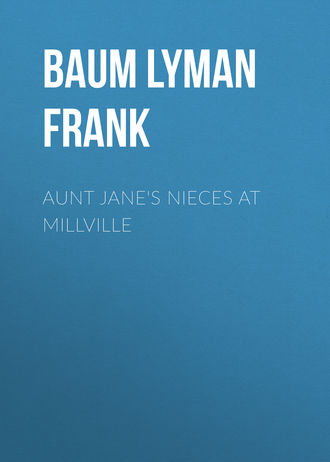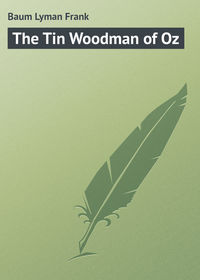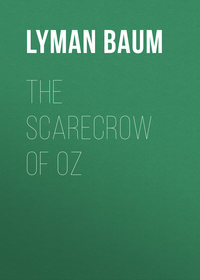 полная версия
полная версияAunt Jane's Nieces at Millville
"I'll not forget such a delightful engagement, be sure."
Uncle John had his pocketbook out, and now he wadded up some bills and thrust them into the little school teacher's hand.
"Drive ahead, Louise," he called. "Good morning, my dear. See you on
Thursday."
As the vehicle rolled out of the yard and turned into the highway, Ethel unrolled the bills with trembling fingers.
"If he has dared – !" she began, but paused abruptly with a smile of content.
The rich man had given her exactly one hundred dollars.
CHAPTER IX.
THE LIVES OF THE SAINTS
On Wednesday afternoon McNutt drove the sad-eyed sorrel mare over to the Wegg farm again. He had been racking his brain for a way to get more money out of the nabob, for the idea had become a veritable passion with him and now occupied all his thoughts.
That very morning an inspiration had come to him. Among other occupations he had at one time adopted that of a book-agent, and by dint of persistent energy had sold numerous copies of "Radford's Lives of the Saints" to the surrounding farmers. They had cost him ninety cents a copy and he had sold them at three dollars each, netting a fine profit in return for his labor. The books were printed upon cheap paper, fearfully illustrated with blurred cuts, but the covers were bound in bright red with gold lettering. Through misunderstandings three of these copies had come back to him, the subscribers refusing to accept them; and so thorough had been his canvassing that there remained no other available customers for the saintly works. So Peggy had kept them on a shelf in his "office" for several years, and now, when his eye chanced to light upon them, he gave a snort of triumph and pounced upon them eagerly. Mr. Merrick was a newcomer. Without doubt he could be induced to buy a copy of Radford's Lives.
An hour later McNutt was on his mission, the three copies, which had been carefully dusted, reclining on the buggy seat beside him. Arrived at the Wegg farm, he drove up to the stile and alighted.
Louise was reading in the hammock, and merely glanced at the little man, who solemnly stumped around to the back door with the three red volumes tucked underneath his arm. He had brought them all along to make his errand "look like business."
"Where's the nabob?" he asked blind Nora.
"What's that, Mr. McNutt?" she inquired, as if puzzled. She knew his voice, as she did that of nearly everyone with whom she had ever been brought in contact.
"Why, the nabob; the boss; Mr. Merrick."
"Oh. He's in the barn with Tom, I guess."
McNutt entered the barn. Uncle John was seated upon an overturned pail watching Old Hucks oil Joe's harness. The agent approached him with a deferential bow.
"Sir," said he, "you'll 'scuse my comin' agin so soon to be a-botherin'; but I hev here three copies of Radford's famis wucks on the Lives o' the Saints, in a edishun dee looks – "
"A what?"
"A edishun dee looks, which means extry fine. It's a great book an' they's all out'n print 'cept these three, which I hain't no doubt many folks would be glad to give their weight in gold fer, an' some over."
"Stand out of the light, McNutt."
The agent shifted his position.
"Them books, sir – "
"Oh, take 'em away."
"What!"
"I don't read novels."
McNutt scratched his head, perplexed at the rebuff. His "dee looks" speech had usually resulted in a sale. An idea flashed across his brain – perhaps evolved by the scratching.
"The young lady, sir – "
"Oh, the girls are loaded with books," growled the nabob.
The agent became desperate.
"But the young lady in the hammick, sir, as I jest now left, says to tell ye she wants one o' these books mighty bad, an' hopes you'll buy it for her eddificationing."
"Oh; she does, eh?"
"Mighty bad, sir."
Uncle John watched Thomas polish a buckle.
"Is it a moral work?" he asked.
"Nuthin' could be moraler, sir. All 'bout the lives o' – "
"How much is it?"
"Comes pretty high, sir. Three dollars. But it's – "
"Here. Take your money and get out. You're interrupting me."
"Very sorry, sir. Much obleeged, sir. Where'll I leave the book?"
"Throw it in the manger."
McNutt selected a volume that had a broken corner and laid it carefully on the edge of the oat-bin. Then he put his money in his pocket and turned away.
"Morn'n' to ye, Mr. Merrick."
"Stop a bit," said Uncle John, suddenly.
The agent stopped.
"I believe I paid you ten dollars for Miss Ethel Thompson's services. Is that correct?"
"Ye – yes, Mr. Merrick."
McNutt's heart was in his shoes and he looked guiltily at his accuser, the pale blue eyes bulging fearfully.
"Very well; see that she gets it."
"Of course, Mr. Merrick."
"And at once. You may go."
McNutt stumped from the barn. He felt that a dreadful catastrophe had overtaken him. Scarcely could he restrain the impulse to sob aloud. Ten dollars! – Ten dollars gone to the dogs as the result of his visit to the nabob that morning! To lose ten dollars in order to gain three was very bad business policy. McNutt reflected bitterly that he would have been better off had he stayed at home. He ought to have been contented with what he had already made, and the severe manner the nabob had used in addressing him told the agent plainly that he need not expect further pickings from this source.
In the midst of his despair the comforting thought that Ethel would surely refuse the money came to sustain him; so he recovered somewhat his former spirits. As he turned the corner of the house he observed Louise still reading in the hammock.
In some ways McNutt was a genius. He did not neglect opportunities.
"Here's my las' chance at these idjits," he muttered, "an' I'll learn thet nabob what it costs, to make Marsh McNutt stand out'n his light."
Then he hastened over to the hammock.
"'Scuse me, miss," said he, in his most ingratiating voice. "Is yer uncle 'round anywheres?"
"Isn't he in the barn?" asked the girl, looking up.
"Can't find him, high ner low. But he ordered a book of me t'other day – 'Radford's Lives o' the Saints' – an' perhaps you'll take it an' pay me the money, so's I kin go home."
Louise gazed at the man musingly. He was one of the people she intended to pump for information concerning the mystery of Captain Wegg, and she must be gracious to him in order to win his good-will and induce him to speak freely. With this thought in mind she drew out her purse and asked:
"How much were you to be paid for the book?"
"Three dollars, miss."
"Here is the money, then. Tell me – your name is McNutt, isn't it? – how long have you lived in this place?"
"All my life, miss. Thank 'e, miss. Good day to ye, miss."
He placed the book in the hammock beside her.
"Don't go, please." said the girl. "I'd like you to tell me something about Captain Wegg, and of his poor wife who died, and – "
"Nuther time, miss, I'll be glad to. Ye'll find me in my orfice, any time. Jest now I'm in the dumdest hurry ye ever knew. Good day to ye, miss," he repeated, and stumped quickly to the buggy awaiting him. Next moment he had seized the reins and was urging the sorrel mare along the stony lane at her best pace.
Louise was both astonished and disappointed, but after a little thought she looked after the departing agent with a shrewd smile.
"He's afraid to talk," she murmured, "and that only confirms my suspicions that he knows more than he cares to tell."
Meantime McNutt was doing his best to get away from the premises before the discovery was made that he had sold two "Lives of the Saints" to one family. That there might be future consequences to follow his deception never occurred to him; only the immediate necessity for escape occupied his mind.
Nor were his fears altogether groundless. Turning his head from time to time for a glance behind, he had seen Mr. Merrick come from the barn with a red book in his hand and approach the hammock, whereupon the young lady arose and exhibited a second book. Then they both dropped the books and ran into the lane and began shouting for him to stop – the man's voice sounding especially indignant and imperative.
But McNutt chose to be deaf. He did not look around again, and was congratulating himself that he would soon be out of earshot when a sudden apparition ahead caused the mare to halt abruptly. It also caused the cold chills to run down the agent's back. Beth and Patsy had stepped into the lane from a field, being on their way home from their daily walk.
"They're calling to you, sir," said Patsy to the agent. "Didn't you hear them?"
"I – I'm a little deaf, miss," stammered McNutt, who recognized the young ladies as Mr. Merrick's nieces.
"I think they wish you to go back," remarked Beth, thoughtfully watching the frantic waves of Uncle John's chubby arms and Louise's energetic beckonings. They were too far off to be heard plainly, but their actions might surely be understood.
McNutt with reluctance looked over his shoulder, and a second shudder went through him.
"I hain't got time to go back," he said, as an inspiration came to him; "but I guess you kin do jest as well. This book here," picking up the last of the three from the seat, "I offered to sell yer uncle fer five dollars; but he wanted it fer four. I ain't no haggler, you understan', so I jest driv away. Now Mr. Merrick has changed his mind an' is willin' to give five fer it; but there ain't nuthin' small about me. Ef you gals'll jest give me the four dollars ye kin take the book to yer uncle, with my compliments; an' I won't hev t' go back. I'm in a drea'ful hurry."
Patsy laughed at the little man's excited manner.
"Fortunately I have some money with me," she said; "but you may as well take the five dollars, for unless Uncle had been willing to pay it he would not have called you back."
"I think so, myself, miss," he rejoined, taking the money and handing her the volume.
Uncle John and Louise, glaring at the distant group, saw the third red book change hands, and in answer to their renewed cries and gestures Patsy waved the "Lives of the Saints" at them reassuringly and came on at a brisk walk, followed by Beth.
McNutt slapped the sorrel with the ends of the reins so energetically that the mare broke into a trot, and before the girls had come within speaking distance of their uncle, the agent was well out of sight and exulting in the possession of eleven dollars to pay for his morning's work. Even if Ethel accepted that ten, he reflected, he would still be a dollar ahead. But he was sure she would tell him to keep it; and he'd "jest like to see thet air nabob git a penny back agin."
Meantime Uncle John's wrath, which was always an effervescent quality with the little gentleman, had changed to wonder when he saw his nieces approaching with the third red-and-gold book. Louise was leaning against the rail fence and laughing hysterically, and suddenly a merry smile appeared and spread over her uncle's round face as he said:
"Did you ever hear of such an audacious swindle in all your born days?"
"What will you do, Uncle?" asked the girl, wiping the tears of merriment from her eyes. "Have the man arrested?"
"Of course not, my dear. It's worth the money just to learn what talents the fellow possesses. Tell me, Patsy," he continued, as the other nieces joined them, "what did you pay for your book?"
"Five dollars. Uncle. He said – "
"Never mind what he said, my dear. It's all right. I wanted it to add to my collection. So far I've got three 'Lives of the Saints' – and I'm thankful they're not cats, or there'd be nine lives for me to accumulate."
CHAPTER X.
THE MYSTERY DEEPENS
Ethel Thompson came over the next day, as she had promised, and the sweet-faced, gentle school-mistress won the hearts of Uncle John's three nieces without an effort. She was the eldest of them all, but her retired country life had kept her fresh and natural, and Ethel seemed no more mature than the younger girls except in a certain gravity that early responsibility had thrust upon her.
Together the four laughing, light-hearted maids wandered through the pines, where the little school-ma'am showed them many pretty nooks and mossy banks that the others had not yet discovered. By following an unsuspected path, they cut across the wooded hills to the waterfall, where Little Bill Creek made a plunge of twenty feet into a rocky basin below. In spite of the bubbles, the water here showed clear as crystal, and the girls admiringly christened it the "Champagne Cup." They shed their shoes and stockings and waded in the pool, enjoying the sport with shrieks of merry laughter – more because they were happy than that there was anything to laugh at.
Afterward they traced the stream down to a lovely glade a half mile above Millville, where Ethel informed them the annual Sunday-school picnic was always held, and then trailed across the rocky plateau to the farm. By the time they reached home their appetites were well sharpened for Mary's excellent luncheon, and the afternoon was devoted to rest under the shady pines that grew beside the house.
It was now, when they felt thoroughly acquainted and at ease in one another's society, that the girls indulged in talks concerning events in their past, and Ethel was greatly interested in the nieces' recital of their recent trip abroad with Uncle John. They also spoke frankly of their old life together at Elmhurst, where Aunt Jane, who was Uncle John's sister, had congregated her three nieces for the purpose of choosing from among them one to inherit her vast estates. It seemed no source of regret to any of them that a boy, Kenneth Forbes, had finally succeeded to Aunt Jane's property, and this may be explained by the fact that Uncle John had at that interesting juncture appeared to take charge of the nieces. It was quite evident that the eccentric but kindly old fellow had succeeded in making these three girls as happy as their dispositions would allow them to be.
After the most interesting phases of their personal history had been discussed, the nieces began, perhaps unconsciously, to draw from Ethel her own story. It was simple enough, and derived its interest mainly from the fact that it concerned their new friend. Her parents had both passed away while she was young, and Ethel had always lived with her father's father, big Will Thompson, a man reputed very well-to-do for this section, and an energetic farmer from his youth.
Old Will had always been accused of being unsociable and considering himself above the neighboring farmers; and it was true that Bob West, the implement dealer, was his only associate before Captain Wegg arrived. A casual acquaintance with the Millville people might easily explain this.
With the advent of the Weggs, however, a strong friendship seemed to spring up between the retired sea captain and the bluff, erratic old farmer, which lasted until the fatal day when one died and the other became a paralytic and a maniac.
"We have always thought," said Ethel, "that the shock of the Captain's death unsettled my grandfather's mind. They had been sitting quietly in Captain Wegg's room one evening, as they were accustomed to do, when there was a sudden fall and a cry. Thomas ran in at once, and found grandfather raving over the Captain's dead body. The old seaman had heart disease, it seems, and had often declared he would die suddenly. It was a great blow to us all, but especially to Joe."
Her voice softened at this last remark, and Patsy exclaimed, impulsively:
"Tell us about Joe Wegg. Did you like him?"
"Yes," said Ethel, simply; "we were naturally thrown much together in our childhood, and became staunch friends. Grandpa often took me with him on his visits to the Weggs, and sometimes, but not often, the Captain would bring Joe to see us. He was a quiet, thoughtful boy; much like his mother, I imagine; but for some reason he had conceived an intense dislike for his father and an open hatred for this part of the country, where he was born. Aside from these morbid notions, Joe was healthy-minded and frank and genuine. Had he been educated in any other atmosphere than the gloomy one of the Wegg household I am sure Joe's character would have been wholly admirable, and I have never blamed the boy much for his peculiarities. Captain Wegg would not permit him to go to school, but himself attended to such instructions as Joe could acquire at home, and this was so meager and the boy so ambitious that I think it was one cause of his discontent. I remember, when I was sent to school at Troy, that Joe sobbed for days because he could not have the same advantages. He used to tell me wonderful stories of what he would accomplish if he could only get out into the world.
"When he implored his father to let him go away, Captain Wegg used to assure Joe that he would some day be rich, and there was no need of his preparing himself for either a business or a profession; but that did not satisfy Joe's ambition, as you may imagine. And, when the end came, scarcely a dollar of money could be found among the Captain's possessions, and no other property than this farm; so it is evident he deceived his son for some selfish purpose.
"Joe was at last free, and the only thing I reproach him for is going away without a word to me or any of his friends. I heard, indirectly, of his working his way through a technical school, for he was always crazy about mechanics, and then he went to New York and I lost all further trace of him."
"What do you suppose became of Captain Wegg's money?" asked Louise.
"I've no idea. It is a singular thing that most of my grandfather's savings disappeared at the same time. On account of his mental condition he can never tell us what became of his little fortune; but luckily the returns from the farm, which we rent on shares, and my own salary as teacher of the district school, enable us to live quite comfortably, although we must be economical."
"Why, it's really a romance!" cried Patsy, who had listened eagerly.
"There are many romances in real life," added Beth, in her undemonstrative way.
Louise said nothing, but her heart was throbbing with excitement engendered by the tale, which so strongly corroborated the suspicions she had begun to entertain. When Ethel had gone home Louise still deliberated upon this fascinating mystery, and her resolve grew to force some sort of an explanation from the smiling lips of Old Hucks. For the sole available witness of that fatal night's tragedy, when one strong man died and another was driven mad, was Thomas Hucks. The old servitor was also in a position to know much of the causes leading up to the catastrophe, he having been the confidential retainer of Captain Wegg for many years. Hucks must speak; but the girl was wise enough to realize that he would not do so unless urged by coaxing or forced by strategy. There was doubtless good reason why the old man had remained silent for three years. Her plan was to win his confidence. Interest him in Joe's welfare, and then the truth must come out.
The frankly related story of Ethel had supplied Louise with the motive for the crime, for that a crime had been committed she was now doubly sure. Captain Wegg had money; old Will Thompson had money; both were well-to-do men. In a retired country district, where there were no banks, it was reasonable to suppose they kept large sums of money on hand, and the knowledge of this fact had tempted some one to a dreadful deed. Captain Wegg had been killed and old Thompson perhaps injured by a blow upon the head from which he had never recovered. Any suspicion the fair young detective may have entertained that Thompson himself had killed his friend was eradicated by the fact that he had been robbed at the same time.
Louise had originally undertaken her investigation through curiosity and a desire to amuse herself by unveiling the mystery. Now she began to reflect that she was an instrument of justice, for a discovery of the truth might restore a fortune to poor Joe Wegg, now struggling with the world, and put sweet Ethel Thompson in a position where the necessity for her to teach school would be abolished. This thought added a strong impulse to her determination to succeed.
Sunday afternoon the girl took blind Nora for a long drive through the country, taking pains to explain to her all the points of interest they came to, and delighting the old woman with her bright chatter. Louise had been kind to Nora from the beginning, and her soft, sympathetic voice had quite won the poor creature's heart.
On the way home, in the delightful summer twilight, the girl dexterously led the conversation toward Nora's past history.
"Was Thomas a sailor when you married him?" she asked.
"Yes, miss. He were bos'n on Cap'n Wegg's schooner the 'Lively Kate,' an' I were livin' with Miss Mary, as come to be Mrs. Wegg arterward."
"Oh, I see. And were you blind then, Nora?"
"No, miss. I went blind arter our great trouble come to us."
"Trouble? Oh, I'm so sorry, dear. What was it?"
The old woman was silent for a time. Then she said:
"I'd better not mention it, I guess. Thomas likes to forgit, an' when I gets cryin' an' nervous he knows I've been thinkin' 'bout the old trouble."
Louise was disappointed, but changed the subject adroitly.
"And Miss Mary, who was afterward Mrs. Wegg. Did you love her, Nora?"
"Indeed I did, child."
"What was she like?"
"She were gentle, an' sweet, an' the mos' beautiful creetur in all – in – in the place where we lived. An' her fambily was that proud an' aristocratic thet no one could tech 'em with a ten-foot pole."
"I see. Did she love Captain Wegg?"
"Nat'rally, sense she married of him, an' fit all her fambily to do it. An' the Cap'n were thet proud o' her thet he thought the world lay in her sweet eyes."
"Oh. I had an idea he didn't treat her well," remarked the girl, soberly.
"That's wrong," declared Nora, promptly. "Arter the trouble come – fer it come to the Weggs as well as to Tom an' me – the Cap'n sort o' lost heart to see his Mary cry day arter day an' never be comforted. He were hard hit himself, ye see, an' that made it a gloomy house, an' no mistake."
"Do you mean after you moved here, to the farm?"
"Yes, deary."
"I hear Captain Wegg was very fond of Ethel's grandfather," continued
Louise, trying to find an opening to penetrate old Nora's reserve.
"They was good friends always," was the brief reply.
"Did they ever quarrel, Nora?"
"Never that I knows of."
"And what do you suppose became of their money?" asked the girl.
"I don't know, child. Air we gettin' near home?"
"We are quite near, now. I wish you would open your heart to me, and tell me about that great trouble, Nora. I might be able to comfort you in some way."
The blind woman shook her head.
"There's no comfort but in forgettin'," she said; "an' the way to forgit ain't to talk about it."
The unsatisfactory result of this conversation did not discourage Louise, although she was sorry to meet with no better success. Gradually she was learning the inside history of the Weggs. When she discovered what that "great trouble" had been she would secure an important clue in the mystery, she was sure. Nora might some time be induced to speak more freely, and it was possible she might get the desired information from Old Hucks. She would try, anyway.
A dozen theories might be constructed to account for this "great trouble." The one that Louise finally favored was that Captain Wegg had been guilty of some crime on the high seas in which his boatswain, Old Hucks, was likewise implicated. They were obliged to abandon the sea and fly to some out-of-the-way corner inland, where they could be safely hidden and their whereabouts never discovered. It was the knowledge of this crime, she conjectured, that had ruined sweet Mrs. Wegg's life and made her weep day after day until her guilty husband became surly and silent and unsociable.
Louise now began to cultivate Thomas, but her progress was slow. Patsy seemed to be the old man's favorite, and for some reason he became glum and uncommunicative whenever Louise was around. The girl suspected that Nora had told her husband of the recent conversation, in spite of her assertion that she wished to avoid all reference to their great trouble.









